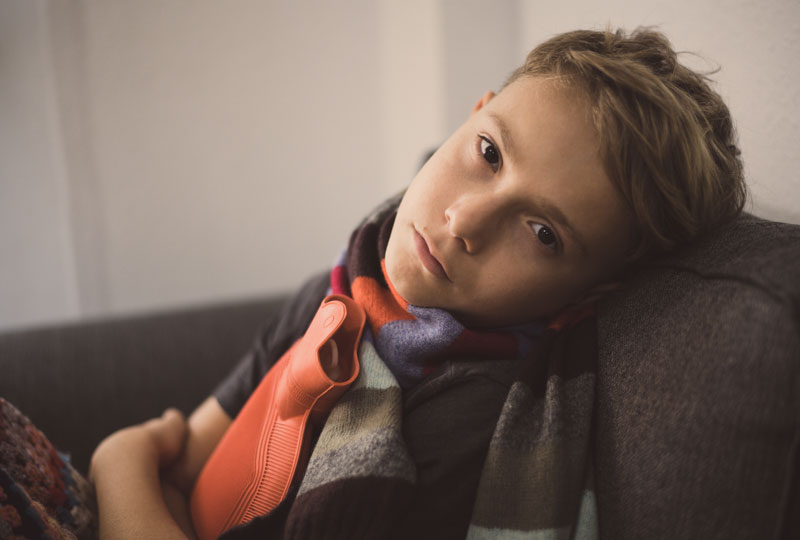If your child is complaining of stomach pain and headaches, their pain could stem from school anxiety.
Perhaps it’s no surprise that some children experience headaches and/or stomachaches with a dread of going to school. They may balk at going at all.
Katie Spencer, Psy.D, HSP, helps children recognize that we all have physical feelings that come with our emotions. Spencer is a licensed pediatric psychologist who works with children admitted to Monroe Carell Jr. Children’s Hospital at Vanderbilt for medical and/or mental health concerns.
How anxiety causes stomach pains in children
Spencer explains the school-day stomachaches to anxious children this way: When excited, we may experience a burst of energy — like the silly character Olaf in the Disney movie “Frozen.” When we are angry, we may feel hot and tense, like the Hulk in Marvel comics. And when calm, we may feel warm and relaxed, like we’re on a beach vacation. A child can experience “butterflies” in the stomach when thinking about a test at school, feel like the heart is racing before before try-outs for a sports team, or have trouble catching his or her breath when hearing bad news.
Physical feelings connected to emotions are common, and automatic. This is known as the mind-body connection.
When worried, sad or stressed for a long time, children (adults, too!) may complain of headaches, stomachaches or other physical discomfort. There can be physical reasons for headaches or stomachaches, so if this is happening frequently with your child, you should discuss it with the pediatrician. Be aware, however, that these complaints of stomach pains in the morning can also be caused by stress or school anxiety. Difficult emotions can also worsen pre-existing pains.
How to talk to your child about school anxiety
“Many children have a hard time understanding how their emotions connect to these physical (somatic) symptoms,” Spencer said. “It can be helpful to talk to your child about the mind-body connection, label her emotions, validate her feelings (even if you disagree), and recognize that the pain she has is real. Knowing you can talk with her about it and help her manage the symptoms is important.”
Diagnoses of anxiety in children are increasing. Spencer reports that she and her colleagues are seeing more children with pain and somatic symptoms. When symptoms last a long time and are more intense, it can be hard for children to do their regular activities, such as going to school, playing sports and socializing with friends. Some children refuse to go to school or are sent home early, and this cycle can be hard to break and difficult for families.
How parents can help a child with anxiety stomachaches
Spencer suggests these tips to ease a child’s school anxiety:
- Keep doing normal daily activities. Even when the pain is present, maintain a regular routine, including going to school and participating in sports and social activities.
If reducing some activity is necessary, be sure you’re not providing any “special” treatment – for example, don’t let your child stay home and play video games all day. (If it’s more fun to be home, Spencer pointed out, “why would they want to go back to school?”) Gradually increase activity. Talk with your child’s teacher, school counselor and pediatrician to help with a full return to school.
- Minimize the attention you give to your child’s symptoms. Keep your general focus instead on what the child can do rather than what the child cannot. Talking about the pain and paying attention to the pain complaints can make it worse.
- Focus on healthy coping. Help your child shift attention away from pain and toward distracting activities and helpful coping strategies. Coping strategies may include deep breathing (“belly breathing”) and muscle relaxation. Keep coping skills calm and fun.
Coping skills for school-related anxiety
Generally, Spencer advised, parents should view a child missing school like an adult missing work. If they miss a lot of school (to the point that they’re not doing their “job”), this is a sign you need some help. Start by talking to your child’s school counselor and school nurse to create a plan. Some children respond well to a reward system for attendance. Others do well with 5- to 10-minute breaks during the school day to use their coping strategy before returning to class.
A child psychologist or counselor can help children (and parents) learn ways to better cope with anxiety, stress and pain. Spencer also encourages parents to practice coping strategies with their child, making it a positive experience to work through symptoms together.
Katie Spencer, PsyD, HSP is a licensed pediatric psychologist with over 10 years of experience working with children, teens and young adults with chronic medical conditions, anxiety and mood disorders. She is an Assistant Professor of Clinical Pediatrics at Monroe Carell Jr. Children’s Hospital at Vanderbilt and works with children admitted to the hospital for medical and/or mental health conditions.

After-Hours care for your child
Vanderbilt’s Children’s After-Hours Clinics offer the convenience of a walk-in clinic with care provided by a board-certified pediatrician from Children’s Hospital. No appointment is necessary, but it’s wise to call your child’s pediatrician first.

